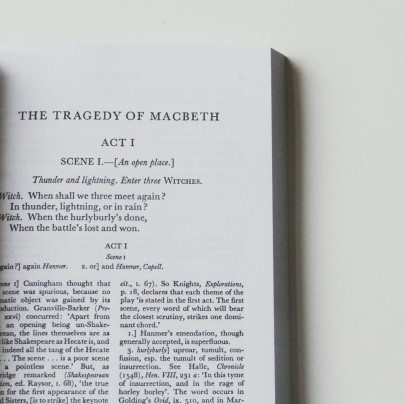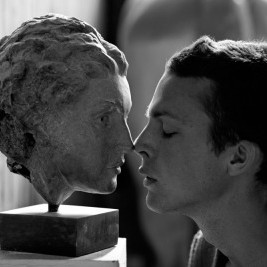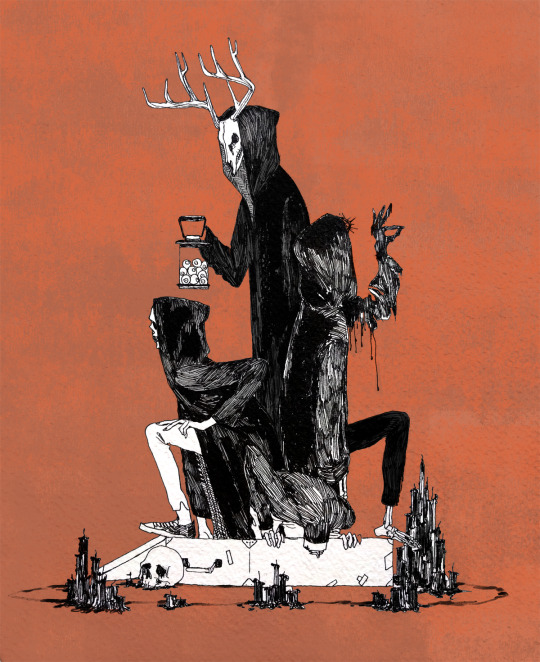Text
“You say you live in pain. Let it be the pain of the death of the old false self, and the life-movement of the new real truthful self. We are all wrapped in silky layers of illusion which we instinctively feel to be necessary to our existence. Often these illusions are harmless, in the sense that we can still go on being reasonably good and reasonably happy. Sometimes, because of a catastrophe, a bereavement or some total loss of self-esteem, our falsehoods become pernicious, and we are forced to choose between some painful recognition of truth and an ever more frenzied manufacturing of lies. Live at peace with despair. Live quietly with your sense of guilt. Sit beside it, as it were, and regard the frightful wound to your self-esteem as the removal of deep illusions which existed before and which this chance has torn. If you keep checking any lie and resisting the anger which deforms the world, you will gradually realise that the poor old wounded self, with its furious whining and its hatred of itself and everything else, is not you at all. That self is dying, but another self is watching it die.”
— Iris Murdoch.
(via kuanios)
2K notes
·
View notes
Photo

Petra Skoulipova
Seductive Dance
1986
10K notes
·
View notes
Quote
My heart is a place with no native tongue.
Logan February, from “Self-Portrait as Damaged Goods,” published in The Shallow Ends (via lifeinpoetry)
3K notes
·
View notes
Quote
We learned so much, this you know well:
how, gradually, what could not be taken away
is taken. People, countrysides.
And the heart does not die when one thinks it should,
we smile, there is tea and bread on the table.
Czeslaw Milosz, “Elegy for N.N.”
13 notes
·
View notes
Photo

Source: haighani on instagram
15K notes
·
View notes
Photo


Stella De Libero wedding dress
37K notes
·
View notes
Photo

Modern Mythology: Callisto
“I do not know who I am, where I am going — and I am the one who has to decide the answers to these hideous questions.”
A modern Callisto who still resembles the constellations that used to be her bones and she can’t remember how it is to be human. Something raw crawls beneath her skin and she is just as far away from this earth as the stars as her feet learn again how to walk upon the forests she once knew. Only her eyes are human these days, everything else is still trying to remember, though her limbs resist, knowing that on this earth, she lost all she has ever known, and all she can do is roam, only welcoming the wild into her arms. However, there are times she makes her way outside of the darkness, but only in search of ghosts, for the one that has brought her death twice, and she would still find a way to give him the world if he asked. She peers into all of the eyes of men, hoping they match her own, hoping they hold starlight. Some days, she finds them in everyone, her son is everywhere, his voice in the winds that chill her to the bone. And she prays for the stars again, for it was in the heavens that she wasn’t alone.
2K notes
·
View notes
Quote
“[…] I have not been wounded, nor has my house been destroyed, but I have spent the last two and a half years taking care of the victims of the war, the prisoners, and just in this sector, in this small part of the war, I have learned all about its senselessness and cruel horror. I could not care less that the people are seemingly enthused by the war. The people have always been dumb. Even when they had the choice between Jesus and the murderer, they decided for Barabbas with great zeal. Perhaps they will continue to decide for Barabbas. But that is not a reason at all for me to go along with their decision
Hermann Hesse, in a letter to Hans Sturzenegger, 1917 (via soracities)
144 notes
·
View notes
Quote
A witch is, actually, a successful (in the sense of surviving) deviant. You have a cultural, ideological, social, what-not pattern which is, for that society in question, normal (and, importantly, this is understood as a synonym for natural). Most people survive because they conform to these patterns, because they behave normally. […] But then suddenly you get a deviant which survives, and since it does not draw its support from the normal pattern, […] that deviant is understood as drawing its support from “unknown,” “supernatural” sources. […] If we cannot survive without our order, how can she [the witch] survive in solitude? Hers must be indeed a very powerful order to exist so independently, without all the inter cooperation and individual compromise which we have to go through to survive. And if it is so powerful, then it could destroy us. We must try to destroy it first.
Maya Deren, “From the Notebook of Maya Deren”, c.October 1947, vol. 14: pages 21–45 (via malglories)
7K notes
·
View notes
Photo









Lock up your libraries if you like; but there is no gate, no lock, no bolt that you can set upon the freedom of my mind.
birthday moodboard for the ever wonderful @writingletterstoshakespeare
612 notes
·
View notes
Text
They asked: How would you like your death?
Blue, like stars pouring from a window. Would you like more wine?
Mahmoud Darwish
2K notes
·
View notes
Quote
It occurred to me then, not for the first time, that the central component of cruelty was joy.
C. A. Kaufman, from “Object Permanence,” published in Harvard Review Online (via lifeinpoetry)
527 notes
·
View notes
Text
here is a tip—scream
Kathleen Rowe, The Unruly Woman: Gender & The Genres of Laughter
…voices in any culture that are not meant to be heard are perceived as loud when they do speak, regardless of their decibel level.
“The Gender of Sound,” Glass, Irony and God, Anne Carson
Aristotle tells us that the high-pitched voice of the female is one evidence of her evil disposition, for creatures who are brave or just (like lions, bulls, roosters and the human male) have large deep voices…. High vocal pitch goes together with talkativeness to characterize a person who is deviant from or deficient in the masculine ideal of self-control. Women, catamites, eunuchs and androgynes fall into this category. Their sounds are bad to hear and make men uncomfortable…. Putting a door on the female mouth has been an important project of patriarchal culture from antiquity to the present day. Its chief tactic is an ideological association of female sound with monstrosity, disorder and death…. Woman is that creature who puts the inside on the outside. By projections and leakages of all kinds—somatic, vocal, emotional, sexual—females expose or expend what should be kept in…. [As Plutarch comments,] “…she should as modestly guard against exposing her voice to outsiders as she would guard against stripping off her clothes. For in her voice as she is blabbering away can be read her emotions, her character and her physical condition.”… Every sound we make is a bit of autobiography. It has a totally private interior yet its trajectory is public. A piece of inside projected to the outside. The censorship of such projections is a task of patriarchal culture that (as we have seen) divides humanity into two species: those who can censor themselves and those who cannot…. It is an axiom of ancient Greek and Roman medical theory and anatomical discussion that a woman has two mouths. The orifice through which vocal activity takes place and the orifice through which sexual activity takes place are both denoted by the word stoma in Greek (os in Latin) with the addition of adverbs ano and kato to differentiate upper mouth from lower mouth. Both the vocal and the genital mouth are connected to the body by the neck (auchen in Greek, cervix in Latin). Both mouths provide access to a hollow cavity which is guarded by lips that are best kept closed.
“Introduction: A Tarantella of Theory,” Sandra M. Gilbert in The Newly Born Woman, Hélène Cixous and Catherine Clément
There is a voice crying in the wilderness, Catherine Clément and Hélène Cixous say—the voice of a body dancing, laughing, shrieking, crying. Whose is it? It is, they say, the voice of a woman, newborn and yet archaic, a voice of milk and blood, a voice silenced but savage.
“New World Order: The Scream’s a Good Weapon,” Sarah Nicole Prickett
The scream’s a good weapon—fast, concealed. Sometimes the only one we’ve got. When babes imperiled are furthermore mute, like Helen in The Spiral Staircase (1949), Madeline in the Swedish Thriller (1973), and Thana in Ms. 45 (1981), or speechless, like Catherine Deneuve in Repulsion (1965), the situation feels irremediable. A girl without tongue is a eunuch.
“Medea Gives Advice to a Young Girl with a Broken Heart,” Letters From Medea, Salma Deera
you will rise.
and are you less of a woman for this? no
what is woman?
woman is this—enduring.
listen girl, you will survive this–you will.
but what fool said you had to do it silently?
here is a tip—scream
6K notes
·
View notes





